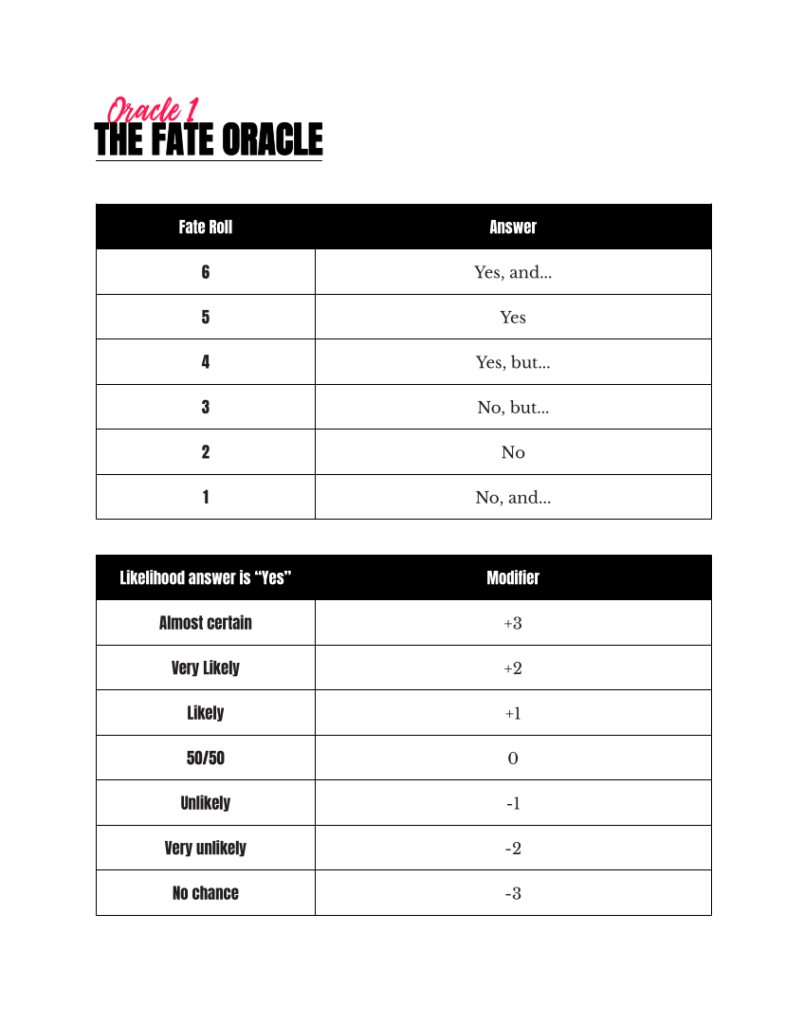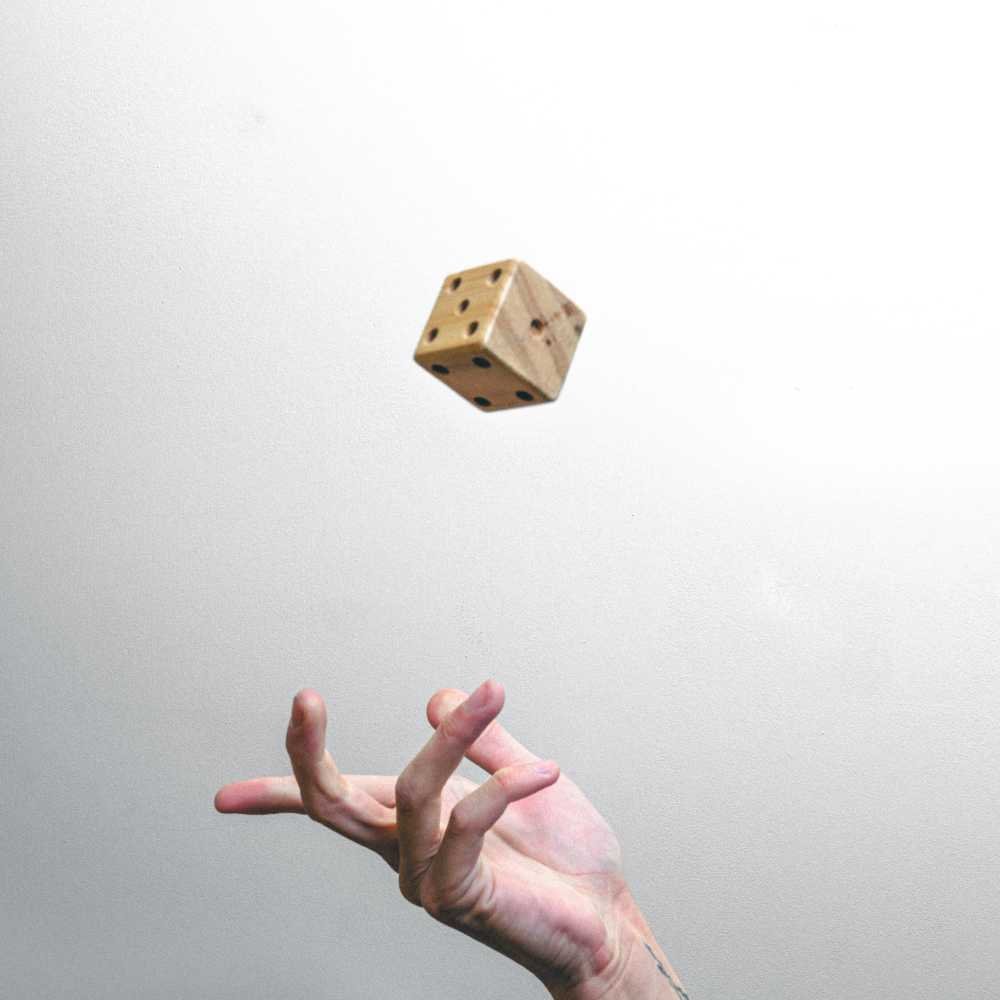What is a solo roleplaying oracle?
The solo roleplaying oracle is the most basic method for solo play. Oracles are special tools and tables that procedurally generate content for your solo roleplaying games through a question and answer format. The player then uses these oracles’ answers to help them create the adventure as they play. These answers can also be used together with ChatGPT to further enhance the game as detailed in the Solo DM Guide Part 3 – ChatGPT As Assistant AI Dungeon Master. For a more detailed guide on how to use oracles alongside AI, take a look at Oracle Solo Roleplaying Magazine Issue 1.
Players create the game as they play by:
- Asking questions and selecting the most appropriate oracles.
- Using their chosen oracles’ answer to improvise a roleplaying scene.
However, if you’re looking for solo games similar to Fighting Fantasy and other “choose your own adventure” game books, visit this page.
The Yes/No Solo Roleplaying Oracle
The simplest question you can ask a solo roleplaying oracle is a yes/no question. The Fate oracle answers a range of simple questions about your game world. It’s derived from FU: The Freeform Universal RPG.
Here are a few examples:
- Does the mansion have a basement?
- Are there guards posted outside?
- Can I pick the lock without being seen?
To answer a yes/no question about your game, perform a Fate roll by rolling a 1d6 and finding your answer on the table below.

You would’ve noticed that the Fate oracle not only gives “yes” and “no” as answers. It also provides variations such as “yes, and…” or “yes, but…”. A “6” is the most positive result and a “1” is the most negative. To understand what these different answers mean, we will use an example. We will look at how the same solo roleplaying oracle can give different answers about the same scene.
Using the Fate Oracle
First envision the scene that you want to interact with within your game. Then ask the Fate oracle a yes/no question. Use the answers from the solo roleplaying oracle and the inner logic of your story to populate the scene.
For example, you’re investigating a murder scene. You’re looking for any clues about the killer’s identity. You ask the question “Do I find any clues about the killer?” You roll a 1d6 for a yes/no answer. Here are some possible Fate oracle answers:
6 Yes, and…
The answer to your question is “yes”, but with an extra positive twist. In our example, it can mean “yes”, you find a clue about the killer, and it’s an important lead.
5 Yes
The simple default “yes” without any added twists or factors. In our example, the answer is “yes”, you do find a clue about the killer. However, the kind of clue it is and how much it reveals depends on more Fate rolls.
4 Yes, but…
The answer is “yes”, but there’s a negative twist to the answer. Yes, you find clues, but don’t tell you much about the killer’s identity. You will have to keep digging.
3 No, but…
The answer is “no”, but there’s a positive twist. No, you don’t find any clues about the killer, but find a clue about a potential witness.
2 No
A simple default “no” answer. You don’t find a clue about the killer at the crime scene.
1 No, and…
The answer is “no”, but with an added negative twist. You don’t find any clues and what you find is worthless and tells you nothing.

Join Oracle RPG’s newsletter for free guides and adventures, plus more articles like this one!
Fate Oracle Modifier
The only way to change the outcome of the Fate oracle is through roleplaying and skill checks. If you succeed in a skill check that’s relevant to the scene, you can add your character’s proficiency bonus to the Fate roll. For a more in-depth discussion on how skill checks work in the Oracle system please read Skill Checks In Solo Roleplaying.
Branching options
You can also use the Fate oracle to choose between two possibilities. Why? During your playthrough, you will be confronted with branching storylines and possibilities and you can use dice rolls to choose between them.
In our previous scene, you decide that there are probably two possible suspects for the murder: a local criminal gang or a highly paid assassin. To decide which of these options are responsible roll a 1d6. A result of 1 to 3 means it’s the gang, while a roll of 4 to 6 would mean it’s an assassin. The logic of your setting and your improvisation skills will provide you with ideas for possible options.
Scale Questions
The Fate oracle can also answer questions such as:
How high is the tower?
What is the time of day?
How far away is the approaching army?
To answer questions like these you can place them on a scale from 1 to 6 and then perform a Fate Roll. To know how high a tower is rolling a “1” might indicate a tower with a single story, while a “6” will be an incredibly high and formidable tower. If you want to know how far away an approaching army is, a “1” shows that it’s close by, and a “6” shows it’s very far away.
The other solo roleplaying oracles on this website give you the ability to answer more complex questions such as:
What are those NPCs talking about?
What’s happening in the market?
What kind of work do I find on the billboard?
What does the town look like?
What’s inside a dungeon room?
Collecting your own oracles
We strongly recommend that every player start their own collection of oracles. There are many random tables available online and in books that you can use as oracles. Any table that can add fun content to a game or answer questions counts as an oracle. So where do I find them? One of the best resources for oracles and random tables is Mythmere Games’ Tome Of Adventure Design. The original classic was the go-to reference for solo players for years, and the revised edition is fantastic. Alternatively, you can invest in Ultimate Toolbox by World’s Largest RPGs. Another massive collection of random tables. This book is a treasure trove of oracles that range from dungeon generation to NPC creation. This resource is equally useful compared to the Tome of Adventure Design, and makes an excellent addition to your solo library.
However, if you want to go the free route, this site contains a few free oracles to get your feet wet. They are a starting point and you should create and collect your own as soon as possible.
Here are a list of the oracles our system uses for D&D 5e:
The Fortune Oracle is the Oracle RPG system’s version of the tarot . This oracle uses playing cards to procedurally generate events in your game world. It’s an extremely flexible tool that you can use in a variety of ways.
The Random Event Oracle introduces random events into your story to create story hooks and keep your adventures interesting. At appropriate times the Fortune oracle will show you that a random event is occurring. This event creates changes in your game world that you will have to adapt to.
The NPC Generator uses the playing cards to create an NPC. These tables will provide the NPC with a character role, personality, and motivations. All you need to do is draw three playing cards to create the NPC.
The Adventure Generator will provide you with adventure ideas and missions to do in-game. All you need to do is draw a card and consult the tables.
The Dungeon Generator provides tables that will enable you to create random dungeons and wilderness locations that you can explore.
Monster AI for Solo DnD Encounters covers the Oracle system’s dice-based AI rules for monsters. We will show you how to control an enemy using dice rolls and special AI rules.
How to use oracles and not “cheat”
How do you prevent yourself from cheating? What kind of questions is okay to ask? When asking oracles questions keep the following in mind at all times:
- Is my question consistent with the adventure’s setting and situation? Does it follow the logic of my story?
- Does my question make the game more fun?
Story logic is extremely important when playing a game without a DM. Every question you ask must be as plausible as possible. Always keep the setting and the adventure in mind. If you’re in a tavern in Baldur’s Gate asking, “Did someone leave a Deck of Many Things on the table?” wouldn’t make sense. Why would someone leave such a valuable item on a table in a random tavern?
If you’re playing cooperatively then make sure that your questions make the game as fun as possible for everyone. Trying to sneak onto a ship? Ask whether there are lookouts. Make sure that your questions create fun situations for yourself and other players.
Using oracles correctly
There is no limit on how many times you can consult an oracle. You can try to clarify an oracle’s answer by asking more and more questions. We strongly advise against this approach. Don’t try to automatically generate every scene, detail, and event with dice. This makes the game feel too random. Go with your instincts and use the oracles to fill in the gaps.
Conclusion: How to use solo roleplaying oracles, step by step
- Ask a question and choose the most appropriate oracle to answer your question.
- Roll the required dice or draw one or more playing cards.
- Consult the oracle and look at the answer it gives you.
- Apply the answer to the context of your situation, setting, and lore. Does it give you any ideas or sparks of inspiration?
- If you have your answer incorporate it into the scene and continue playing.
If you’re struggling with the answers to the oracle you’re using, try again, use another oracle, or go with your instincts. For a deeper discussion on oracles and how to use them alongside AI, refer to Oracle Solo Roleplaying Magazine Issue 1.






